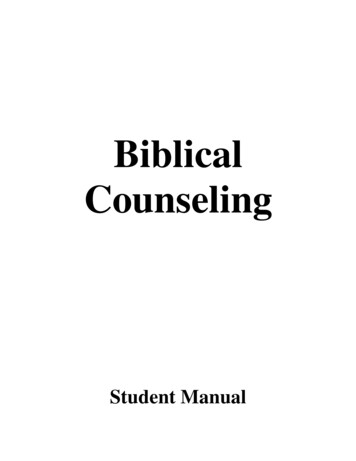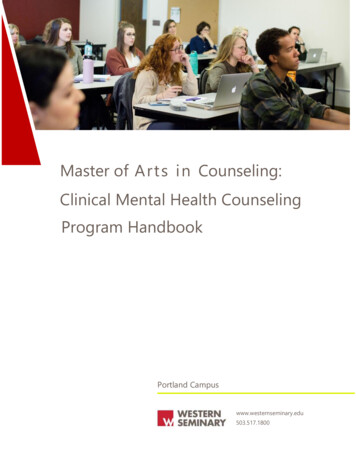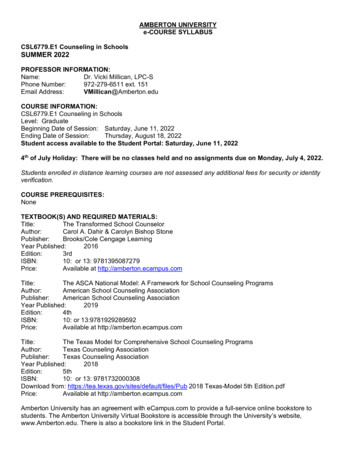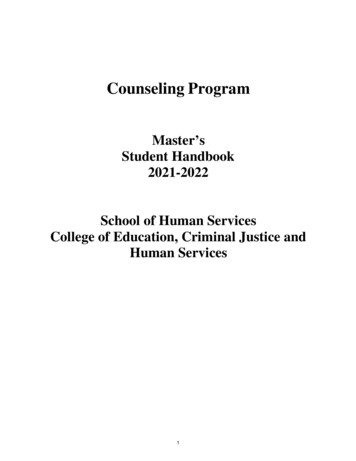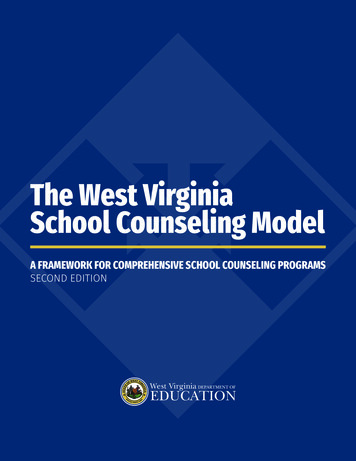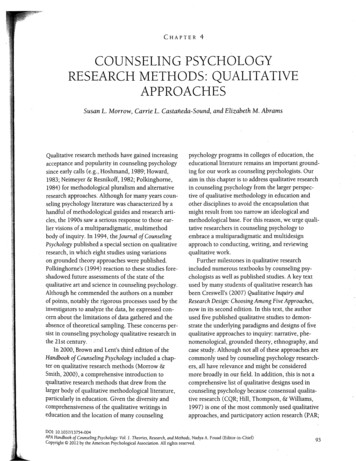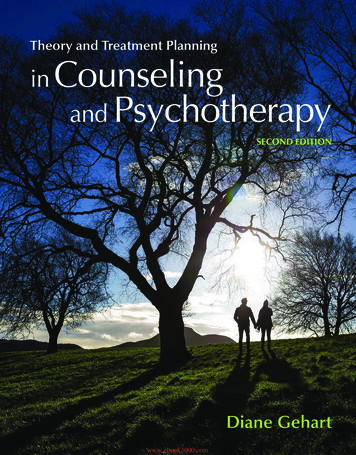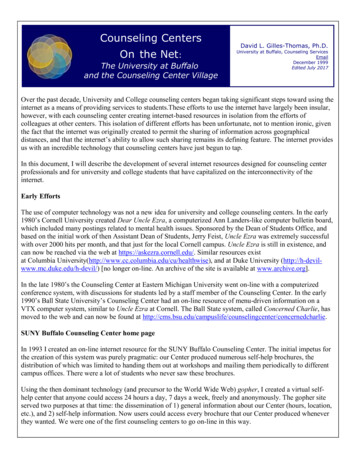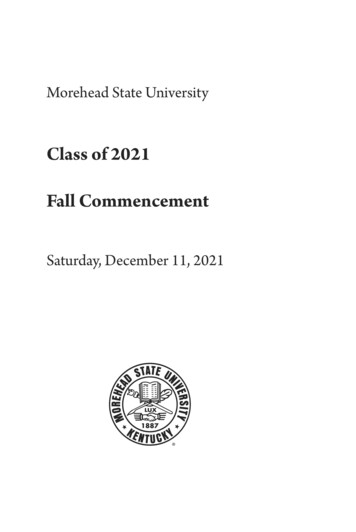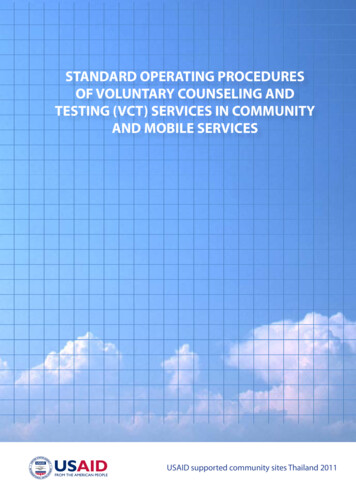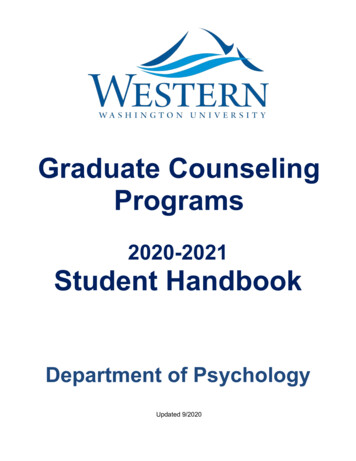
Transcription
Graduate CounselingPrograms2020-2021Student HandbookDepartment of PsychologyUpdated 9/2020
Table of 122222222232323242425Mission Statement & ObjectivesCACREP StandardsCommon Core Curricular AreasClinical Mental Health CounselingSchool CounselingAcademic RequirementsMaster of Science in Clinical Mental Health CounselingMaster of Education in School CounselingStudent Group ExperiencePlan of StudyRegistration for ClassesAcademic LoadScholarship StandardsEvaluation, Retention, Remediation & DismissalAdvancement to CandidacyTime LimitsContinuous EnrollmentApplication for the Master’s DegreeFunding for the Enhancement of Graduate ResearchThesis Requirements - Option IComprehensive Examinations - Option IIInternshipsClinical Mental Health CounselingSchool CounselingInternship placementCriteria for assigning students to field settingsFingerprintingEndorsement PolicyClinical Mental Health CounselingClinical Mental Health Counseling LicenseSchool CounselingNational Certified Counselor (NCC) and Certified Clinical Mental HealthCounselor (CCMHC)Professional OrganizationsNational AssociationsRegional and State Associations2
Table of Contents - 636363737373737383838393939404041Academic Grievance Policy and ProceduresPolicyAcademic GrievancesProceduresInformal ResolutionAppeal to the BoardAppeal to the Vice President for Academic AffairsMaintenance of RecordsDefinitionsDiversity Recruitment PolicyWWU policies on equal opportunity/nondiscrimination, affirmative action,sexual harassment, and reasonable accommodation.Washington State ResidencyStudent Services and ResourcesCampus Recreation ServicesCareer ServicesTechnology SupportCounseling, Health and Wellness ServicesCounseling CenterPrevention and Wellness ServicesAlcohol and Drug Consultation and Assessment (ACDAS)Consultation and Sexual Assault Support (CASAS)Wellness Outreach CenterStudent Health CenterDay-Care FacilitiesDisAbility Resources for Students (DRS)Funding and SupportFinancial AidWork StudyTeaching AssistantshipsHousingOn-Campus HousingOff-Campus HousingLibrariesStudent Transportation and ParkingTextbooksThe Hacherl Reading and Writing StudioGraduate Counseling Faculty3
Program Mission and Objectives4The mission of the WWU Clinical Mental Health and School Counseling Program is to prepareknowledgeable, skilled, collaborative, and ethical counselors who value diversity, equity and socialjustice and meet the relevant licensing or credentialing standards for practice in mental health andeducational settings in the State of Washington.We believe this is best accomplished in small rigorous programs in which students havesubstantive opportunities to acquire evidence-based knowledge and develop their professionaland interpersonal skills under the supervision of faculty who are committed to training exceptionalcounselors.Program ObjectivesAs a faculty, we strive to prepare counselors who: Demonstrate the knowledge and skills outlined in the CACREP Basic and SpecialtyStandards.Think critically about professional issues and engage in ethical, reflective decision-making.Advocate for equity and social justice and demonstrate self-awareness in developingmulticultural competence.Utilize current research and evidence to implement and evaluate effective counselingservices and programs.Engage in respectful, collaborative relationships with clients, colleagues and communitypartners.CACREP StandardsThe Counseling Programs at WWU have been accredited by the Council for the Accreditation ofCounseling and Related Educational Programs (CACREP) since 1993 and are accredited through2023. Created in 1981, CACREP is the accrediting body of the American Counseling Association.CACREP works with institutions of higher education to ensure that graduate programs incounseling meet established preparation standards. (www.cacrep.org)Consistent with the 2016 CACREP standards, common core curricular experiences anddemonstrated knowledge in each of the eight common core curricular areas are required of allstudents in the Clinical Mental Health Counseling and School Counseling programs.Common Core Curricular Areas1. PROFESSIONAL COUNSELING ORIENTATION AND ETHICAL PRACTICE
5a. history and philosophy of the counseling profession and its specialty areas;b. the multiple professional roles and functions of counselors across specialty areas, and theirrelationships with human service and integrated behavioral health care systems, including interagencyand interorganizational collaboration and consultation;c. counselors’ roles and responsibilities as members of interdisciplinary community outreach andemergency management response teams;d. the role and process of the professional counselor advocating on behalf of the profession;e. advocacy processes needed to address institutional and social barriers that impede access, equity, andsuccess for clients;f. professional counseling organizations, including membership benefits, activities, services to members,and current issues;g. professional counseling credentialing, including certification, licensure, and accreditation practices andstandards, and the effects of public policy on these issues;h. current labor market information relevant to opportunities for practice within the counselingprofession;i. ethical standards of professional organizations and credentialing bodies, and applications of ethical andlegal considerations in professional counseling.j. technology’s impact on the counseling profession;k. strategies for personal and professional self-evaluation and implications for practicel. self-care strategies appropriate to the counselor role, andm. the role of counseling supervision in the profession.2. SOCIAL AND CULTURAL DIVERSITYa. multicultural and pluralistic characteristics within and among diverse groups nationally andinternationally;b. theories and models of multicultural counseling, cultural identity development, and social justice andadvocacy;c. multicultural counseling competencies;d. the impact of heritage, attitudes, beliefs, understandings, and acculturative experiences on anindividual’s views of others;e. the effects of power and privilege for counselors and clients;f. help-seeking behaviors of diverse clients;g. the impact of spiritual beliefs on clients’ and counselors’ worldviews, andh. strategies for identifying and eliminating barriers, prejudices, and processes of intentional andunintentional oppression and discrimination.3. HUMAN GROWTH AND DEVELOPMENTa.b.c.d.e.theories of individual and family development and transitions across the lifespan;theories of learning;theories of normal and abnormal personality development;theories and etiology of addictions and addictive behaviors;biological, neurological, and physiological factors that affect human development, functioning, andbehavior;f. systemic and environmental factors that affect human development, functioning, and behavior;g. effects of crisis, disasters, and trauma on diverse individuals across the lifespan;h. a general framework for understanding differing abilities and strategies for differentiated interventions,andi. ethical and culturally relevant strategies for promoting resilience and optimum development andwellness across the lifespan.
4. CAREER DEVELOPMENT6a. theories and models of career development, counseling, and decision making;b. approaches for conceptualizing the interrelationships among and between work, mental well-being,relationships, and other life roles and factors;c. processes for identifying and using career, avocational, educational, occupational and labor marketinformation resources, technology, and information systems;d. approaches for assessing the conditions of the work environment on clients’ life experiences;e. strategies for assessing abilities, interests, values, personality and other factors that contribute tocareer development;f. strategies for career development program planning, organization, implementation, administration,and evaluation;g. strategies for advocating for diverse clients’ career and educational development and employmentopportunities in a global economy;h. strategies for facilitating client skill development for career, educational, and life-work planning andmanagement;i. methods of identifying and using assessment tools and techniques relevant to career planning anddecision making, andj. ethical and culturally relevant strategies for addressing career development.5. COUNSELING AND HELPING RELATIONSHIPSa.b.c.d.e.f.g.h.i.j.k.l.m.n.theories and models of counseling;a systems approach to conceptualizing clients;theories, models, and strategies for understanding and practicing consultation;ethical and culturally relevant strategies for establishing and maintaining in-person and technologyassisted relationships;the impact of technology oh the counseling process;counselor characteristics and behaviors that influence the counseling process;essential interviewing, counseling, and case conceptualization skills;developmentally relevant counseling treatment or intervention plans;development of measurable outcomes for clients;evidence-based counseling strategies and techniques for prevention and intervention;strategies to promote client understanding of and access to a variety of community-based resources;suicide prevention models and strategies;crisis intervention, trauma-informed, and community-based strategies, such as Psychological First Aid,andprocesses for aiding students in developing a personal model of counseling.6. GROUP COUNSELING AND GROUP WORKa.b.c.d.e.f.g.h.theoretical foundations of group counseling and group work;dynamics associated with group process and development;therapeutic factors and how they contribute to group effectiveness;characteristics and functions of effective group leaders;approaches to group formation, including recruiting, screening, and selecting members;types of groups and other considerations that affect conducting groups in varied settings;ethical and culturally relevant strategies for designing and facilitating groups, anddirect experiences in which students participate as group members in a small group activity, approvedby the program, for a minimum of 10 clock hours over the course of one academic term.7. ASSESSMENT AND TESTING
a.b.c.d.e.f.g.h.i.j.k.l.m.7historical perspectives concerning the nature and meaning of assessment and testing in counseling;methods of effectively preparing for and conducting initial assessment meetings’;procedures for assessing risk of aggression or danger to others, self-inflicted harm, or suicide;procedures for identifying trauma and abuse and for reporting abuse;use of assessments for diagnostic and intervention planning purposes;basic concepts of standardized and non-standardized testing, norm-referenced and criterionreferenced assessments, and group and individual assessments;statistical concepts, including scales of measurement, measures of central tendency, indices ofvariability, shapes and types of distributions, and correlations,reliability and validity in the use of assessmentsuse of assessments relevant to academic/educational, career, personal, and social development;use of environmental assessments and systematic behavioral observations;use of symptom checklists, and personality and psychological testing;use of assessment results to diagnose developmental, behavioral, and mental disorders, andethical and culturally relevant strategies for selecting, administering, and interpreting assessment andtest results.8. RESEARCH AND PROGRAM EVALUATIONa. the importance of research in advancing the counseling profession, including how to critique researchto inform counseling practice;b. identification of evidence-based counseling practices;c. needs assessments;d. development of outcome measures for counseling programs;e. evaluation of counseling interventions and programs;f. qualitative, quantitative, and mixed research methods;g. designs used in research and program evaluation;h. statistical methods used in conducting research and program evaluation;i. analysis and use of data in counseling, andj. ethical and culturally relevant strategies for conducting, interpreting, and reporting the results ofresearch and/or program evaluation.Clinical Mental Health CounselingStudents who are preparing to work as clinical mental health counselors will demonstratethe knowledge and skills necessary to address a wide variety of circumstances within the contextof clinical mental health counseling. Counselor education programs with a specialty area in clinicalmental health counseling must document where each of the lettered standards listed below iscovered in the curriculum.1. FOUNDATIONSa. history and development of clinical mental health counseling;b. theories and models related to clinical mental health counseling;c. principles, models, and documentation formats of biopsychosocial case conceptualization andtreatment planning;d. neurobiological and medical foundation and etiology of addiction and co-occuring disorders, ande. psychological tests and assessments specific to clinical mental health counseling.2. CONTEXTUAL DIMENSIONSa. roles and settings of clinical mental health counselors;
8b. etiology, nomenclature, treatment, referral, and prevention of mental and emotional disorders;c. mental health service delivery modalities within the continuum of care, such as inpatient, outpatient,partial treatment and aftercare, and the mental health counseling services networks;d. diagnostic process, including differential diagnosis and the use of current diagnostic classificationsystems, including the Diagnostic and Statistical Manual of Mental Disorders (DSM) and theInternational Classification of Diseases (ICD);e. potential for substance use disorders to mimic and/or co-occur with a variety of neurological, medical,and psychological disorders;f. impact of crisis and trauma on individuals with mental health diagnoses;g. impact of biological and neurological mechanisms on mental health;h. classifications, indications, and contraindications of commonly prescribed psychopharmacologicalmedications for appropriate medical referral and consultation;i. legislation and government policy relevant to clinical mental health counseling;j. cultural factors relevant to clinical mental health counseling;k. professional organizations, preparation standards, and credentials relevant to the practice of clinicalmental health counseling;l. legal and ethical considerations specific to clinical mental health counseling, andm. record keeping, third party reimbursement, and other practice and management issues in clinicalmental health counseling.3. PRACTICEa. intake interview, mental status evaluation, biopsychosocial history, mental health history, andpsychological assessment for treatment planning and caseload management;b. techniques and interventions for prevention and treatment of a broad range of mental health issues;c. strategies for interfacing with the legal system regarding court-referred clients;d. strategies for interfacing with integrated behavioral health care professionals;e. strategies to advocate for persons with mental health issues;School CounselingStudents who are preparing to specialize as school counselors will demonstrate the professionalknowledge and skills necessary to promote the academic, career, and personal/socialdevelopment of all P–12 students through data-informed school counseling programs. Counseloreducation programs with a specialty area in school counseling must document where each of thelettered standards listed below is covered in the curriculum.1. FOUNDATIONSa.b.c.d.e.history and development of school counseling;models of school counseling programs;models of P-12 comprehensive career development;models of school-based collaboration and consultation, andassessments specific to P-12 education.2. CONTEXTUAL DIMENSIONSa. school counselor roles as leaders, advocates, and systems change agents in P-12 schools;b. school counselor roles in consultation with families, P-12 and postsecondary school personnel, andcommunity agencies;c. school counselor roles in relation to college and career readiness;
9d. school counselor roles in school leadership and multidisciplinary teams;e. school counselor roles and responsibilities in relation to the school emergency management plans, andcrises, disasters, and trauma;f. competencies to advocate for school counseling roles;g. characteristics, risk factors, and warning signs of students at risk for mental health and behavioraldisorders;h. common medications that affect learning, behavior, and mood in children and adolescents;i. signs and symptoms of substance abuse in children and adolescents as well as the signs and symptomsof living in a home where substance use occurs;j. qualities and styles of effective leadership in schools;k. community resources and referral sources;l. professional organizations, preparation standards, and credentials relevant to the practice of schoolcounseling;m. legislation and government policy relevant to school counseling, andn. legal and ethical considerations specific to school counseling.1. PRACTICEa. development of school counseling program mission statements and objectives;b. design and evaluation of school counseling programs;c. core curriculum design, lesson plan development, classroom management strategies, anddifferentiated instructional strategies;d. interventions to promote academic development;e. use of developmentally appropriate career counseling interventions and assessments;f. techniques of personal/social counseling in school settings;g. strategies to facilitate school and postsecondary transitions;h. skills to critically examine the connections between social, familial, emotional, and behavior problemsand academic achievement;i. approaches to increase promotion and graduation rates;j. interventions to promote college and career readiness;k. strategies to promote equity in student achievement and college access;l. techniques to foster collaboration and teamwork within schools;m. strategies for implementing and coordinating peer intervention programs;n. use of accountability data to inform decision making, ando. use of data to advocate for programs and students.Academic RequirementsMaster of Science in Clinical Mental Health CounselingProgram Director and Student Advisor: Dr. Christina ByrneThe Clinical Mental Health Counseling program is accredited by the Council for the Accreditation ofCounseling and Related Educational Programs (CACREP). This program requires a minimum of 96credits for the thesis option, and a minimum of 90 for the non-thesis option. The requirementsare outlined below (all courses are in the Department of Psychology):
10Counseling curriculum courses: All students must take Psychology 502 (Adult Psychopathology),Psychology 532 (Seminar in Cross-Cultural Counseling), 542 (Seminar in DevelopmentalPsychopathology), 550 (Research Methods in Counseling), 553 (Theories of Counseling andPsychotherapy), 555 (Occupations & Career Development), 557 (Testing and Appraisal inCounseling), 558 (Family and Community Systems), 561 (Professional, Legal, and Cultural Issues),564 (Individual Counseling Techniques), 565 (Group Processes in Counseling), 567 (ProfessionalPractice of Counseling), 568 (Crisis Interventions), 570 (Practicum), and 670 (Internship)In addition to the above requirements, thesis students must register for a minimum of 6 thesiscredits (690); non-thesis students must take an area comprehensive examination. For moreinformation on the comprehensive exam, please see the section headed “ComprehensiveExaminations” on page 18 of this handbook.Master of Education in School CounselingProgram Director and Student Advisor: Dr. Diana GrumanThe M.Ed. School Counseling program prepares professional counselors for employment ineducational settings and is designed for those students intending to apply for the state certificatein guidance and counseling at the elementary and secondary levels. Certification as a publicschool teacher is not required for admission to the program. Our School Counseling program isaccredited by the Council for the Accreditation of Counseling and Related Educational Programs(CACREP).The School Counseling Program requires a minimum of 90 credits for non-thesis students. Theprogram contains a thesis option for those students interested in pursuing a research projectrelated to the degree program. Students who choose the thesis option must register for 6 creditsof 690 (Thesis) in addition to the courses below. The requirements are as follows:Counseling curriculum courses: All students must take Psychology 532 (Seminar in Cross-CulturalCounseling), 542 (Seminar in Developmental Psychopathology), Psychology 550 (ResearchMethods in Counseling), 551 (Developmental School Counseling), 553 (Theories of Counseling andPsychotherapy), 555 (Occupations and Career Development), 557 (Testing and Appraisal inCounseling), 558 (Family and Community Systems), 561 (Professional, Legal, and Cultural Issues),564 (Individual Counseling Techniques), 565 (Group Processes in Counseling), 568 (CrisisInterventions), 570 (Practicum), and 670 (Internship)
Student Group Experience11One of the central values of our program is group cohesion and collaboration. Further, we strive tohelp students develop experiential understandings of group purpose, development, dynamics,theories, methods, skills, and group approaches in a multicultural society. To support thedevelopment of both group cohesion and important knowledge/skills related to group counseling,we hire an experienced facilitator to lead group activities over the course of the fall quarter.Plan of StudyAs a degree seeking student, graduate students are responsible for knowing the requirements for theirdegree program. Beginning with the first quarter, all students can access their own plan of study throughDegree Works, an academic planning and degree progress tool that reflects academic progress towardsdegree completion. To access Degree Works in Web4U, navigate to the Students tab, select StudentRecords and select Degree Works. For more information on how to access Degree Works students mayvisit: http://www.wwu.edu/registrar/degreeworks/student instructions.shtmlThe University Catalog lists all policies and requirements for each graduate program:https://catalog.wwu.edu/.Registration for ClassesStudents register for classes at Western Washington University on the /web registration.shtmlInformation regarding how to use this system is included at the website indicated above. Studentswho are accepted into the master’s programs within the Department of Psychology areguaranteed a position in each required class. The Web registration system must be used toregister for all classes, with one exception: Independent study classes (Psychology 500). See thisGraduate School link for the required online independent study forms, which are to be submittedand routed electronically for all rad School/ dir ind study and contract 2.aspxPrior to registering for thesis credits (690), the Graduate School must approve your thesis topicand committee via the Thesis Topic Approval form, submitted online at their website (see ThesisRequirements).After you receive Graduate School approval of your Thesis form, contact both the psychologygraduate programs coordinator in AI 453 and the Graduate School office in Old Main 530 torequest an override code for 690 (thesis) credits. The override code is required in the university’scomputer system so that the Web registration system will allow you to register. You must requestan override code from both offices for each quarter that you register for thesis credits (690).Academic LoadThe maximum credit load for a graduate student is determined in consultation with the student'sgraduate program advisor, within the policies set by the Registrar. The Graduate School definesfull-time enrollment as 8 or more credits per quarter. If you have submitted a FAFSA and been
awarded Financial Aid, your award amount will be determined by your level of enrollment.Contact the Financial Aid office for specific requirements. For purposes of loan deferment, thedefinition of full-time status may vary. Students should contact their lending agency forinformation.12Teaching assistants are governed by other regulations and will receive information from theGraduate Office. All teaching assistants must enroll for a minimum of 8 credits (with someexceptions at the end of a student’s second year; consult the Graduate School for exceptions).Scholarship StandardsA maximum of 10 credits of C is allowed toward the completion of your basic program as definedon the Plan of Study. More than 10 credits of C or lower and U grades, combined, disqualifies astudent from the master's program (please note: no graduate credit is allowed for D or lower, orfor U grades). A grade of C or lower or a U grade count toward the 10-credit limit even if thecourse is retaken and a grade of B or better, or S, is earned.Master's students are not allowed to repeat courses to improve their GPA, but they may berequired by the Department of Psychology to retake a course to document attainment of a certainlevel of competence or knowledge. Pass/No Pass grades are not applicable toward a graduatedegree. S grades are applicable, but not computed in the GPA.An incomplete grade (K) may be assigned in accordance with the regulations outlined in theAcademic Policies section of the University catalog. If, after a calendar year, the courserequirements have not been met, the K grade lapses to a Z. Such Z grades are computed as failinggrades in a student's grade point average and may affect retention in the master's program.Exceptions to the K grade rule are K grades that are received for thesis credits. In this case, the Kgrades are allowed to stand until the thesis is completed, whereupon the K is changed to theearned grade.To remain a candidate for the master's degree, a student must maintain at least a 3.0 GPA incourses listed on the plan of study. The GPA is calculated on letter grades earned (on record) atthe time grades are posted. Students must also be making satisfactory progress in the graduateprogram to which they have been admitted, including continuous demonstration of counselingskills and competencies appropriate to the profession.Under no conditions will a student be allowed to begin Internship (Psychology 670) until they havesuccessfully completed Psychology 565 and both quarters of 570.Student Evaluation, Retention, Remediation, and DismissalEvaluationThe Counseling Faculty at Western has selected six essential dispositions, drawn from establishedcounseling student evaluation tools (e.g. PDCA-RA; CCS-R), to guide the development of workhabits, behaviors and personal characteristics leading to effective professional practice. Thesedispositions are expected of counseling students at the university and in their placements.According to CACREP (2015), dispositions are defined as, “commitments, characteristics, values,
beliefs, interpersonal functioning, and behaviors that influence the counselor’s professionalgrowth and interactions with clients and colleagues.”13We believe that dispositions and behaviors, like skills and knowledge, can be strengthened whenstudents are given regular feedback and support. Our goal is to have every student who isrecommended for graduation demonstrate these dispositions on a consistent basis.At the end of each quarter, faculty meet to review the progress of all students in the program andprovide feedback in the form of a progress letter. Students who demonstrate consistent evidenceof the dispositions will receive a letter to indicate they are in good standing. Students who receivean inconsistent in one or more areas will receive a letter to indicate how to improve their behavioror habits to remain in good standing. The student will then arrange a meeting with the programdirector to develop a plan for improvement for the next quarter. Students who receive anunsatisfactory in any area will be asked to schedule a performance review meeting with theprogram director and two faculty members before proceeding to the next quarter. The expectedoutcome of the performance review meeting will be development of a remediation plan ordismissal from the program.If a student is demonstrating unsatisfactory performance, faculty may initiate a performancereview meeting at any point in the quarter.The following chart provides definitions for each of the six dispositions and examples ofunsatisfactory performance that will impede progress in the itment to academic and clinicalresponsibilities, including: reliableattendance and timeliness; advancepreparation for assignments andabsences; effective management ofappointments and schedule; followthrough on tasks; and adherence tostandards of physical appearance inthe work setting.Displays warmth, respect, positiveaffect, and empathy when interactingwith peers, professors, andsupervisors. Contributes effectively togroups. Supports the growth of othersby providing feedback andencouragement.Maintains personal and professionalwellness, energy and focus bypracticing healthy habits, settingboundaries, managing health issues,and seeking professional help whenneeded.InterpersonalSkillsSelf-CareSome Examples of UnsatisfactoryPerformance-Frequently late or misses class with nowarning-Poorly organized clinic records,presentations or papers-Unprepared for counseling orsupervision sessions or class-After receiving feedback from asupervisor, continues to dress in anunprofessional or unkempt manner-Interacts in an aloof, negative or harshmanner-Displays difficulty in coll
Counseling and Related Educational Programs (CACREP) since 1993 and are accredited through 2023. Created in 1981, CACREP is the accrediting body of the American Counseling Association. CACREP works with institutions of higher education to ensure that graduate programs in counseling meet established preparation standards. (www.cacrep.org)
